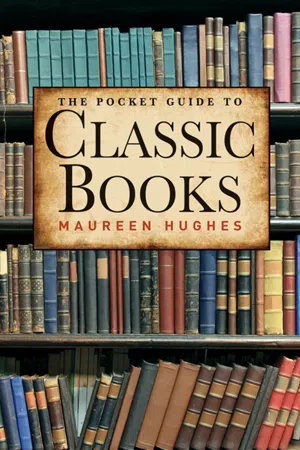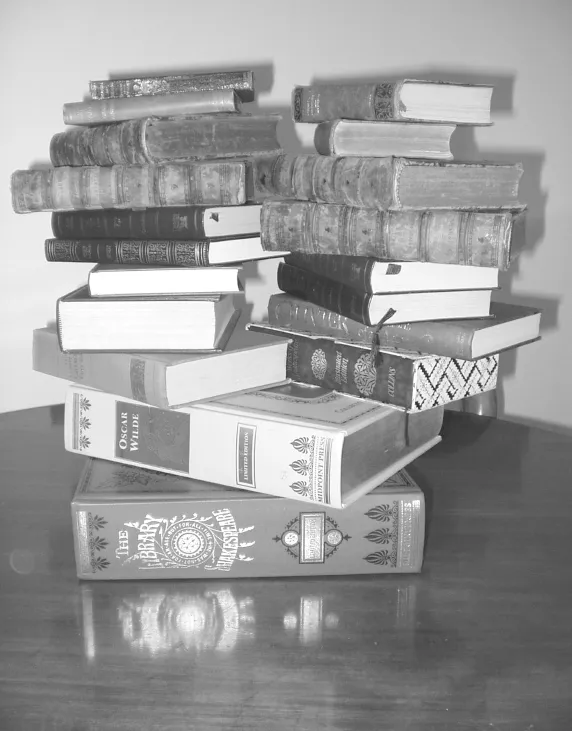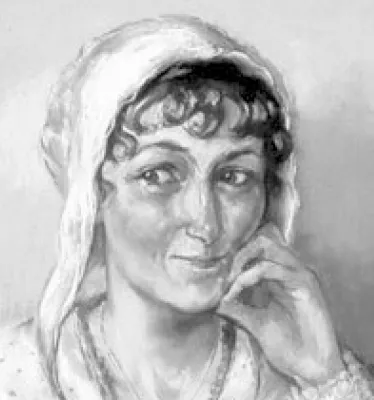
This is a test
- 192 pages
- English
- ePUB (mobile friendly)
- Available on iOS & Android
eBook - ePub
The Pocket Guide to Classic Books
Book details
Book preview
Table of contents
Citations
About This Book
Everything you need to know about classic literature in one handy guide by lecturer Maureen Hughes. Covering everything from the authors to the plays themselves and their common themes, accessibility is a key selling point with factboxes highlighting key or curious facts about the subject. Its size makes it the perfect stocking filler for the Christmas market or at anytime of the year for those wanting more information about what theyre reading or studying in a handy, pocket-sized guide.
Frequently asked questions
At the moment all of our mobile-responsive ePub books are available to download via the app. Most of our PDFs are also available to download and we're working on making the final remaining ones downloadable now. Learn more here.
Both plans give you full access to the library and all of Perlego’s features. The only differences are the price and subscription period: With the annual plan you’ll save around 30% compared to 12 months on the monthly plan.
We are an online textbook subscription service, where you can get access to an entire online library for less than the price of a single book per month. With over 1 million books across 1000+ topics, we’ve got you covered! Learn more here.
Look out for the read-aloud symbol on your next book to see if you can listen to it. The read-aloud tool reads text aloud for you, highlighting the text as it is being read. You can pause it, speed it up and slow it down. Learn more here.
Yes, you can access The Pocket Guide to Classic Books by Kieran Hughes in PDF and/or ePUB format, as well as other popular books in Literature & Classics. We have over one million books available in our catalogue for you to explore.
Information
Chapter One
Welcome to the World of Classic Books
Introduction
THOSE OF you who have read my first two books – The Pocket Guide to Musicals and The Pocket Guide to Plays and Playwrights – will, I am sure, have picked up the enormous influence my wonderful mother had upon every aspect of my life. However, due to the era in which she was born (the 1920s), a childhood plagued with ill health, and the premature death of her own mother when she was just 11 years old, my mother's education was very limited and was brought to an abrupt end when she was just 13 years old. As a consequence she always considered herself uneducated. I know better for she was actually a very intelligent lady with a thirst for knowledge and a respect for the arts, both of which she thankfully passed on to me. I owe her so much and often wonder what (had she been born at a different time and when opportunities were more readily available) she would have achieved. Maybe she would have been a brain surgeon or a great scientist for she had that level of intelligence but it is something I will sadly never know. However, something she did achieve, and to which I aspire, was to treat everyone as equal: she saw neither social nor cultural divide, nor did she consider academics as the intelligent elite. “Knowledge is for everyone,” she would say, “there isn't an exclusivity clause attached to it, all that requires attention is the accessibility to that knowledge.” And so I believe that she would have been delighted to know that I was attempting to open up the world of the Classics to everyone, everywhere. So Mum, this is for you.
This woman, I am proud to call my mother, wanted me to have all the opportunities denied to her and so exposed me to both the theatre and classical literature at a very early age. Each Christmas my stocking always had a least one classic book and a copy of Pears Encyclopaedia. This had an enormous impact upon me, but probably not quite in the way she expected, nor indeed intended. I know that she hoped I would voraciously devour books at the speed of light and be an authority on the Classics – bless her; don't you just love the optimism and belief of mothers! However, this time it slightly misfired and I grew up with a fascination for encyclopaedias, especially children's encyclopaedias, and even now this is the first section I make for in any bookshop! I am not sure, however, whether it is a reflection of my appetite for knowledge, the simplicity of my mind, or simply a deep-rooted desire to revert to my childhood! As for the Classics, to be honest they were always more of an uphill struggle for me, but I so wanted to please my mother that I did read all she bought me. When I look back I realise that I enjoyed a book far more when she had told me, not only the story beforehand, but when she had described the author or the times in which the author lived – in the most theatrical and vividly imaginative way one could ever imagine of course! I thought little of this when I was younger but later when I began teaching English Literature, and without even realising it, I found that I approached each piece of work from the same perspective as my energetically, theatrical mother all those years previously. I stimulated my pupils’ interest by giving them a taster for the work, by telling them about the author and the times in which they lived. For most this was enough and they went on to read the book or, if it was a book we were studying, then this was of enormous help to them. For those not naturally inclined to be ‘bookish’ they told me it was an easier way for them to feel at least a little knowledgeable and so the seeds for this Pocket Guide – sown by my mother all those years ago – were starting to grow and now will hopefully blossom and give both enjoyment and knowledge to others.
Although, thanks to my mother, I am now relatively well read, I can by no means match up to the literary prowess of many and, more importantly in my case, I cannot match up to that of my adored younger cousin Michael whom I swear has read every book ever written; though when sanity prevails I realise this cannot be true! However, when feelings of inadequacy and ignorance creep through the window, good sense it seems just storms right out through that front door and I am then left alone with those all too familiar feelings of being the sole inhabitant of a cultural wilderness, where nothing will grow in my seemingly infertile mind. It's then that I can recall all the various snippets of information fed to me by my mother and suddenly I don't feel quite so stupid after all, because I know something if not everything – you see a little knowledge is not a dangerous thing; it can be a saviour, it has certainly been mine at times!
This book, therefore, is for all those people who like me have found themselves in a situation where all around them appear to be better read. I hope, that after reading this, never again will they feel totally inadequate and want to curl up in embarrassment, knowing that their smiling and nodding during discussions on a particular book is fooling no one, not even themselves. After reading The Pocket Guide to Classic Books they may not be able to discuss the works in any depth of course, but they will have a basic foundation enabling them to nod with some conviction and hopefully it will do for the reader what my mother did for me and encourage them to go on and read the classics – if not, then there are lots of fascinating encyclopaedias out there – I know, because most of these I have read with the passion my mother desired from me at the sight of a book!

The World of Books is for Everyone
What Makes a Classic?
WRITING a book on classical literature I thought would be interesting, fun, stimulating and lots of other things beside; I never thought for one moment that it would be confusing; I was soon to realise just how far from the truth that initial thought had been.
Surely, before beginning this work, all I had to do was to establish exactly who and what would be included in the book and take it from there. What could be difficult about that? In my naivety, it seemed quite straight forward to me, and trust me, naivety is the correct word to use here.
The initial confusion set in when I asked myself the all-important question: ‘What makes a book a classic book and not just another book?’ I soon realised that I didn't actually know the answer to this question. But that didn't worry me too much as I felt sure someone would know. Right? Wrong! This, it would seem, is a question without an answer and further more it also seemed that I had opened a can of worms. Friends argued amongst themselves when asked, teachers were embarrassed that they didn't know and academics were all quite certain that they did know! The trouble here, however, was that none of them agreed with each other – and, more to the point, none of this helped me at all. Just as I was beginning to think that if there was no answer then it really didn't matter at all, my friend Jess threw me into a total state of panic:
“If you're having problems then try thinking of it in terms of a radio/interview question: ‘So, Ms Author, what is it that actually makes a book a classic book?’ … Because” she said, “believe me, that is the question they will all ask you.”
Now I had to have an answer, and there wasn't one. She went on:
“I reckon then that you have to define it first for yourself; first draw up some parameters e.g. a classic has to be ‘x’ years old, or whatever, and then work within those parameters.”
Things were finally looking up. Wrong again. Because every time I drew up ‘some parameters’ I kept moving the goal posts – yes I did say I kept moving them! Eventually I realised that this was my clue, my answer to the unanswerable. At the outset I couldn't see the tunnel, let alone the light; now suddenly it was becoming a little clearer, the tunnel was in sight and a chink of light was penetrating the darkness, and all thanks to the fact that there is no correct and definitive answer.
The penetrating light was the realisation that there are obviously some books which without doubt are very popular now, but you know instinctively that they won't pass the test of time and be read in their thousands hundreds of years hence. So this quickly became one of the original defining parameters: ‘The Test of Time’. However I reconsidered when I looked at some books, which are centuries old and which academics would label a classic, and yet equally I knew were not being read by the universal thousands today. Can you see the circle I was circumnavigating; the treadmill I was on? It was clear that my defining parameters would have to have some liquid fluidity.
It was then that I decided the only way to proceed was by following my own instincts and include what I felt to be correct, the reason for this being that if this is a question without an answer, then who is there to prove me wrong? So, if you don't find what you are looking for in my book I do apologise but equally I do hope you enjoy reading about the entries I have chosen to include.
Once this decision had been taken and the task had become a lot clearer I was now, I hoped, about to write an enjoyable and informative Pocket Guide to Classic Books. Only one more hurdle to jump and that was where should I start? Another difficult decision to take and one that I know will not please everyone, but never-the-less it had to be taken and so I decided to start in the Fifteenth Century; the reason for this being mainly because I thought the appeal would be greater than if I started with earlier works, and let's face it there is little point in self indulgent writing, is there? I wanted to write what – hopefully – people would want to read, so please enjoy.
Maureen Hughes
Chapter Two
The Literary Giants
EACH SEPARATE genre of the arts, be it theatre, opera, literature – or whatever – is generally headed by a ‘giant’ of its field. This is someone who has achieved the top level of attainment, someone to whom other gifted individuals can aspire and someone upon whom the rest of us can simply gaze in awe and with total admiration knowing that they have achieved where many fail.
So many writers, so many greats and so many giants, meant that which to select for inclusion in this section was not an easy decision, but one that had to be taken. So, after extended deliberation you will find below my final decision, together with an explanation, for of course this is only my own humble opinion. However, on this occasion I am quite confident that most will agree with me and the only problem will be that you as the reader will want to add others, as to be honest I did too!
THE BRONTËS are included on the grounds that they are a family of writers; this in itself is a gigantic and incredible achievement and so justifies their place in this section.
JANE AUSTEN qualifies quite simply because it seems to me that even those not interested in literature can, if asked the question, ‘Who wrote Pride and Prejudice?’ answer correctly with Jane Austen. And finally –
CHARLES DICKENS I felt had to be included because just as Shakespeare created fantastic words, which have lived on and come to life through the years, Dickens created fantastically colourful characters who have survived the test of time with some even evolving into adjectives – we all know, for example, what kind of person you are if you are called a Scrooge!
Now, before someone asks me why I haven't included the Bard, then it is quite simply because I have an entire section devoted to William Shakespeare in the predecessor to this book, The Pocket Guide to Plays and Playwrights, and The Pocket Guide to Classics is primarily, though not exclusively, devoted to novelists.
The World of Jane Austen 1775 – 1817

Works by Jane Austen include:
Emma • Lady Susan • Mansfield Park • Northanger Abbey • Persuasion • Pride and Prejudice • Sense and Sensibility •
JANE AUSTEN: The Woman and Her Life
• Jane Austen...
Table of contents
- Cover Page
- Dedication
- Title Page
- Copyright
- Contents
- Acknowledgements
- Chapter One: Welcome to the World of Classic Books
- Chapter Two: The Literary Giants
- Chapter Three: Looking for Information
- Chapter Four: Classic Books for Children
- Chapter Five: Prizes Awarded for Literary Achievement
- Chapter Six: Well I Never Knew That!
- Bibliography
- Index